Some of the most powerful LGBTQ+ stories in global queer cinema come from Chinese-speaking regions. From the rebellious underground classics of the 1990s to beautifully intimate modern dramas, gay Chinese films explore identity, desire, and cultural tension with remarkable depth.
This genre spans across mainland China, Taiwan, and Hong Kong—each with its own social context and cinematic voice. Despite censorship and societal pressure, many filmmakers have created bold, poetic, and unforgettable portrayals of queer love and longing.
While these films offer cinematic depth, you may also want to explore how modern storytelling has evolved in the television format. 
Our curated list of Chinese gay and BL films takes you through 18 essential titles that highlight how representation has evolved, and how universal themes of love, belonging, and self-discovery continue to transcend language and borders.
Best Chinese Gay Movies List
Country: China-Taiwan
Runtime: 118 minutes
Rating: 6.4/10
Where to Watch: YouTube
The narrative centres on the life of Chen Junzhi, the late documentary director, who taught junior high cram school (with the film’s setting moved to high school). Although the three musketeers might not exactly reflect his own experiences or those of his cram school friends at the time, they are motivated by the experiences of those around him and combine them into what is now a somewhat ridiculous, energetic narrative that finally tears to one’s eyes.

Country: China
Runtime: 20 minutes
Rating: 7.5/10
Where to Watch: MUBI, Criterion Channel
From New York, the director returns to his birthplace of Wenzhou in search of his once-familiar self via the distance of a camera—the son who seems “abnormal” in his mother’s perspective. Beyond what the camera records, he talks long-overdue with his mother in front of guilt, opposition, and disappointment. She glances back at him and he seeks for chances for love and approval.
Country: China
Runtime: 20 minutes
Rating: 7.2/10
Where to Watch: Vimeo, Tencent Video
I lost all control of my feelings when the bathroom lad starts crying on a phone call and when the red-haired character shows up at home as the mother walks in. I haven’t laughed like this over a movie in a very long time. I started to cry when the mother did at last touch his forehead. Why, I ask, does a story this basic with typical conflicts impact me so profoundly? Maybe it’s because the casting is so flawless; the way the lad’s expression takes his first puff of a cigarette is so real that it’s almost intolerable to keep watching.
Though as a short film every element—from screenplay to photography and sound—is expertly done, the plot is basic and conventional. This is the core of conventional Chinese schooling as well as sexual repression over five millennia. Previous comparable short films I have watched in China seem harmonic on the surface but never really address the core of Chinese family connections and personal development. They would solve everything with a feel-good approach. This is quite better.
delicate, sensitive, quiet but gorgeous. The grief at its foundation is universal; the entangements and perceptions of the Chinese family are all there. Particularly when such very diverse life events make them such distinct generations, the boy’s investigation and uncertainty, the mother’s quiet, concessions, and too great concern all crush my heart. Whatever is said or how much is spoken, total understanding is still challenging. They can only patiently create a bridge that might not be strong but yet offers some enjoyment.
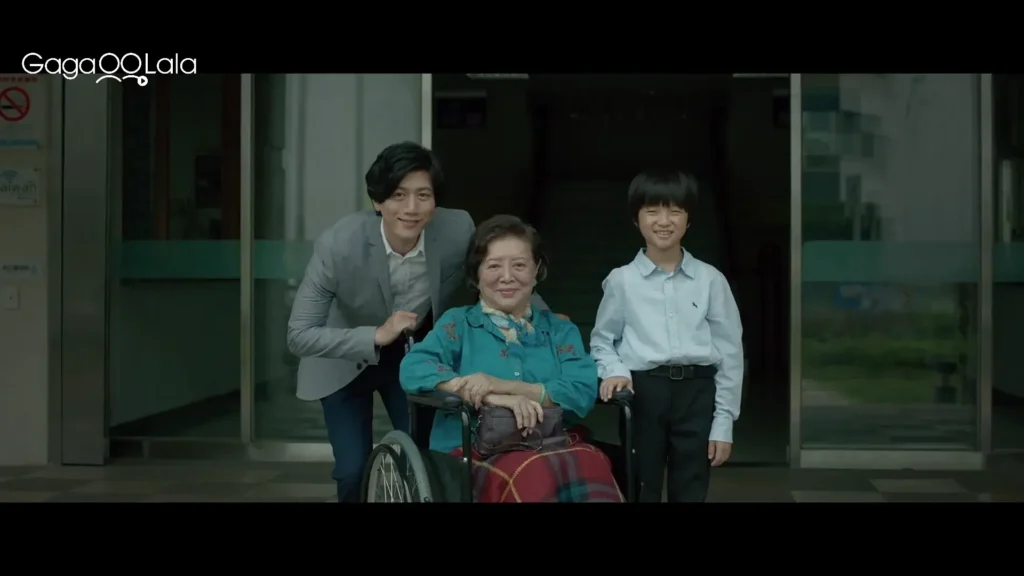
Country: Taiwan
Runtime: 106 minutes
Rating: 7.6/10 (IMDb)
Where to Watch: Netflix, GagaOOLala
Completely deviating from past ways of self-indulgence or self-pity, “Dear Tenant” is the most serious and socially meaningful LGBT film I have watched in recent years. The narrative centres on a male tenant on the top level who not only looks after his old, sick landlady but also adopts her grandson. After the grandmother’s death, his behaviors—which seem out of line for a normal tenant—are under scrutiny; many assume he is trying to fraudulately acquire her estate. He cannot justify himself as concealed behind these deeds is a relationship not acknowledged.
The director uses a suspense technique to approach what seems to be a common family ethical narrative, starting with a flashback and then augmenting with other characters’ points of view, so leaving viewers wondering constantly: why is the protagonist imprisoned and on trial, and what kind of person is he really? Two significant riddles, meantime, are gently buried in the simple story: the death of the child’s father and the grandma. These two truths open doors for viewers to have a closer knowledge of the protagonist.

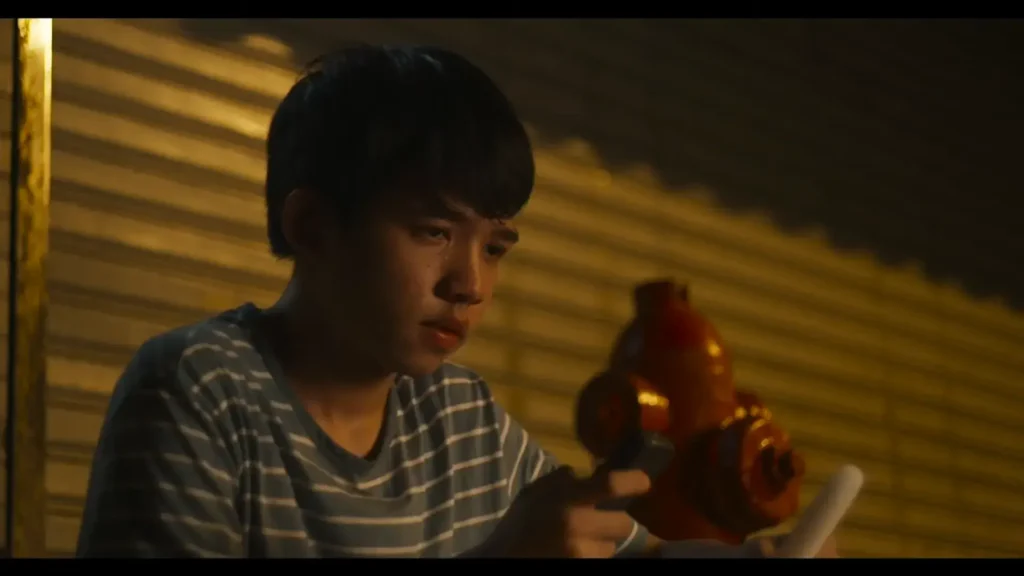
Country: China
Runtime: 19 minutes
Rating: 7.3/10
Where to Watch: Unavailable
Summer Shanghai today. Passionate about dancing and will naturally dance along with pictures of Martha Graham from dance magazines, middle school student Xia Qing has used hearing aids from childhood due to hearing loss. Like all beauty-loving kids, he colours his fingernails red pen. But his single deaf mother mostly questions and misinterpretes these interests.
a movie on a deaf-mute gay youngster hoping to be a dancer. Having encountered such people in real life, I thought the director’s representation was quite honest—emotions completely conveyed in a silent environment. There are not any words in sign language matching LGBTQ terminology. Before discovering their own path out, every deaf-mute gay person who falls in love with someone of the same sex has had to grope in the darkness for a lengthy period. They are truly courageous.

Country: China
Runtime: 129 minutes
Rating: 6.8/10
Where to Watch: Bilibili, iQIYI
This is one of the rare independent homosexual films available on mainland China that emphasises the emotional life of young people and presents a very different viewpoint free from societal concerns or identity discussion, therefore enhancing the authenticity and naturalness of the whole plot. With a budget of merely 6,000 yuan and no more than 6 members, the crew consisted of heterosexual people—all of which is startling. Both primary performers are straight. Most importantly, the movie is so frank and honest— neither evasive nor specifically influenced. When the protagonist states “I need,” I even started to mentally applaud.
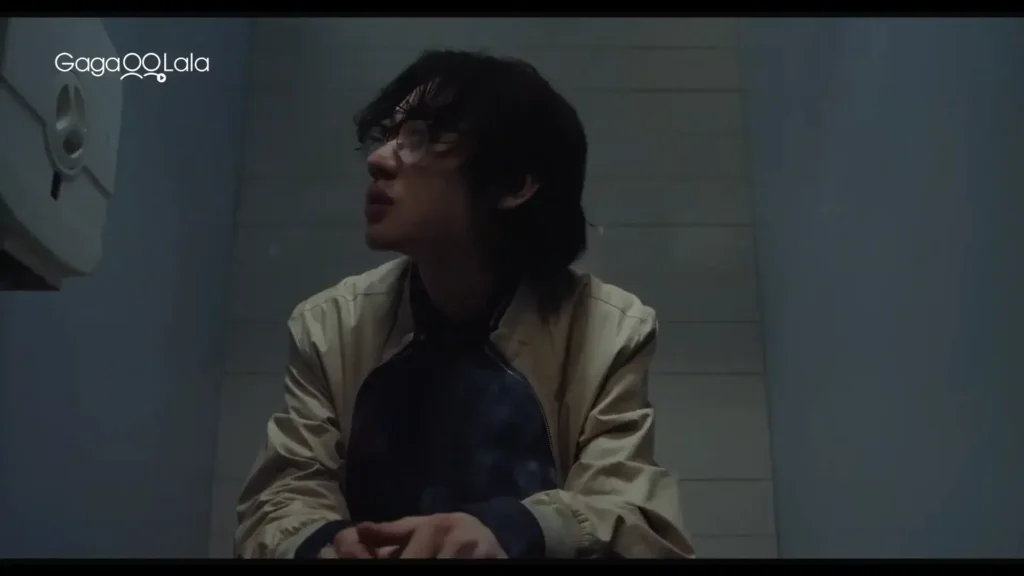
Country: China
Runtime: 9 minutes
Rating: 6.7/10
Where to Watch: Unavailable
A work of award-winning Shanghai-based director Bier Zhong, a graduate of New York University. The movie was chosen for several festivals, including Los Angeles Asian Pacific Film Festival and Shanghai International Film Festival. Inspired by “Laila Dance Hall,” an underground venue for middle-aged and elderly gay men in the Hongkou District, this short film’s title originates from a song by 1950s singer Grace Chang. The protagonist Bier progressively reveals the secrets of a community he has never visited by means of images featuring underground passageways, red high heels, and men’s restroom stalls. Together with their subdued but lonely emotional tone, the yellowish, nostalgic images of the movie probe avenues for longing and forbidden territory of the soul. Everything seen via this reflected lens seems stretched out and provocative.

Country: China
Runtime: 64 minutes
Rating: 7.7/10
Where to Watch: YouTube
Adapted from the true story “Our Twelve Years: A Cycle, This Is a Legend,” “I’m Here” chronicles the narrative of an average gay love between two university students.
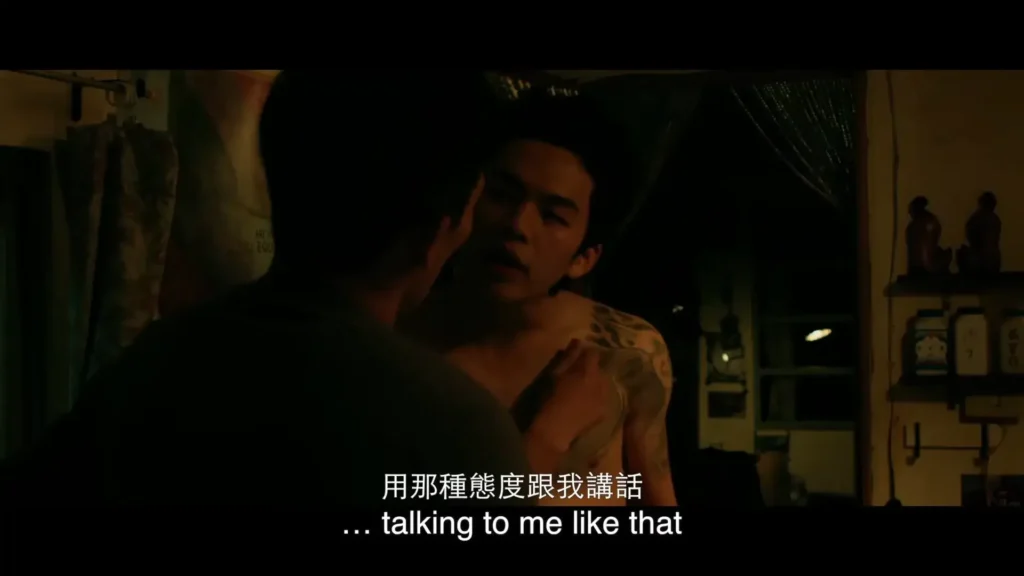
Country: Taiwan
Runtime: 107 minutes
Rating: 7.3/10 (IMDb)
Where to Watch: GagaOOLala, Amazon Prime
Chang Tso-chi’s films feature young heroes who are always unable to resist, yet they can mysteriously assert autonomy inside light and darkness, thus unable to escape the grip of reality. The many Taipei stories and infinite neon glitter show a drunken mother followed by three men standing in for life, dreams, and death. The movie features narrow, limited compositions that only leave gaping and bewilderment behind them, outside of emotion. Animals are aggressive; fantasies cannot always come true; raising a glass to drowns just makes one sad.

Country: China
Runtime: 72 minutes (Part 1), 114 minutes (Part 2)
Rating: 7.9/10
Where to Watch: iQIYI, Tencent Video
At first, Wu Shuang and Chen Wei’s narrative seems to be that of any average gay couple: they meet by chance, are drawn to each other, rapidly grow close, and throughout this period they might still be tempted by others or consider ex-partners. Then, as the relationship grows, different conflicts surface and then fierce arguments follow. Common couples would usually split at this time, with the lucky ones maybe still friends. Then Zhutou shows up as a link allowing Wu Shuang and Chen Wei to effectively negotiate this trying time, resulting in the poignant love tale we know today.

Country: China
Runtime: 35 minutes
Rating: 7.1/10
Where to Watch: Youku, Bilibili
We call this uncertainty the type of feeling that is difficult to explain whether it has more components of love or if the name friendship more fits it. Just such a vague movie is “My Spiritual Medicine”. The almost-kiss when lips meet millimetres of touching, the sensual music running through, the undercurrents of desire in quiet-spoken words, even the soft cotton clothes are subtly intermingled. These feelings stay momentarily in the transitory visuals, like a dragonfly touching water or sand slinking through fingers, unreachable to cling onto.
Though none have arouse the same emotions, I have seen other films with ideas like “My Spiritual Medicine.” “My Own Private Idaho” left me feeling more depressed and persecuted; “The Love of Siam” has an innocent, naive tone. Since “My Spiritual Medicine” is a tale between two grown men, the emotional trip it takes is more subtle, sophisticated, and subdued. All meets and lost chances are configurations of fate.
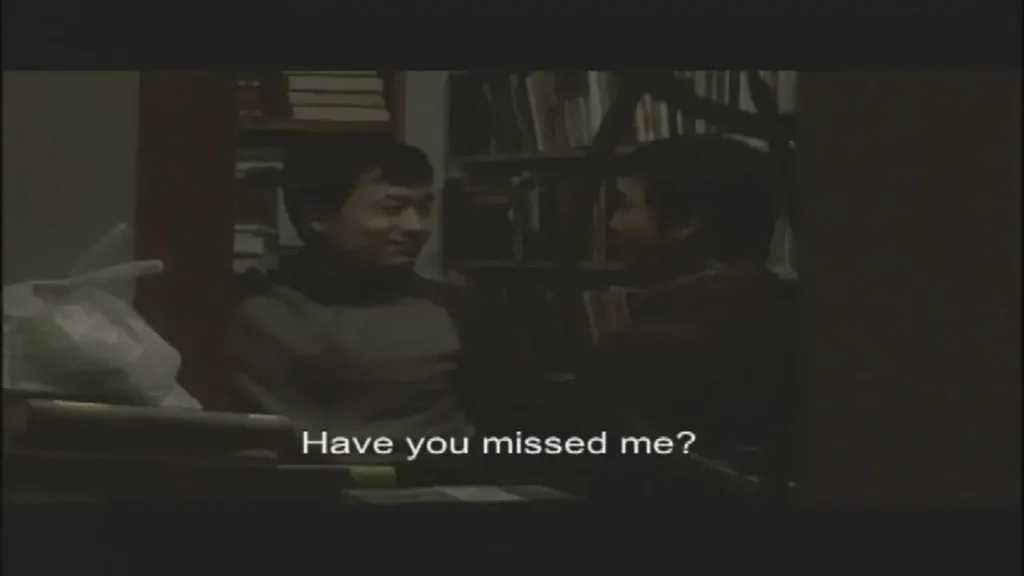
Country: China
Runtime: 106 minutes
Rating: 8.1/10
Where to Watch: GagaOOLala, MUBI
Running a little bookshop in Nanjing, Wang Ping had an affair with gay Jiang Cheng behind his wife Lin Xue’s back. Concerned about her husband’s actions, Lin Xue employs Luo Haitao to pursue Wang Ping and discovers Jiang Cheng. At the travel firm where Jiang Cheng works, the enraged Lin Xue sets up a scene that drives him to split from Wang Ping. Although Luo Haitao’s girlfriend Li Jing (Zhuo Tan) works in an apparel factory, he develops affections for Jiang Cheng during his monitoring. Luo Haitao finds it hard to let go of Li Jing as he gets more close to the emotionally shattered Jiang Cheng. Li Jing breaks down in tears after learning the dubious relationship between Luo Haitao and Jiang Cheng while on route together. Many people battle along their emotional paths in one city.
The movie received the Best Screenplay trophy and was nominated for the Palle d’Or at the 62nd Cannes Film Festival in 2009. The director produces a really compelling experience by deftly and precisely handling the emotional sequences. Chen Sicheng and Qin Hao give quite strong performances. The subdued colour palette of the movie naturally makes one sad when combined with soft music. One statement from the movie comes to me: “Not that I enjoy the worldly dust, but it seems I was mislead by a past relationship. Flowers fall and bloom when it suits them.
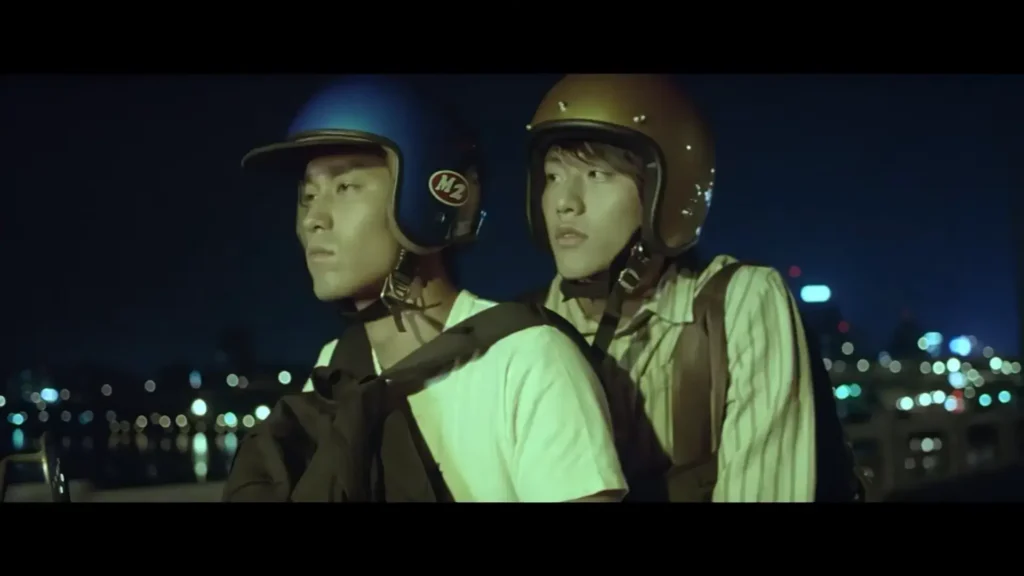
Country: Taiwan
Runtime: 105 minutes
Rating: 7.2/10
Where to Watch: Netflix, GagaOOLala
Kang Zhengxing studies elementary school along the shore. The teacher assigns him, as class monitor, to accompany Yu Shouheng, a hyperactive child, thus progressively affect him and transform him into a well-adjusted child. Though in Kang Zhengxing’s heart this friendship becomes something different as they grow up. They become good friends.
Before them one day a girl called Huijia shows up. This lonely girl falls fast in love with Zhengxing, but his heart loves someone else. Knowing Zhengxing’s emotions, Huijia starts to be his friend. Feeling that both Zhengxing and Huijia are absolutely essential in his life, Shouheng also starts to pursue Huijia but does not want Zhengxing to know too soon. Their lives start to spiral into anarchy with their own secrets; until at last they divulge their secrets to each other by the sea.
We are all growing up; maybe, the youth of Zhengxing and Shouheng has show up in our own life at some time. We have all experienced loneliness; we have all been perplexed about friendship and love. Youth has a bit bluish in tone, much as the images in “Eternal Summer”. Eventually it will get brighter.
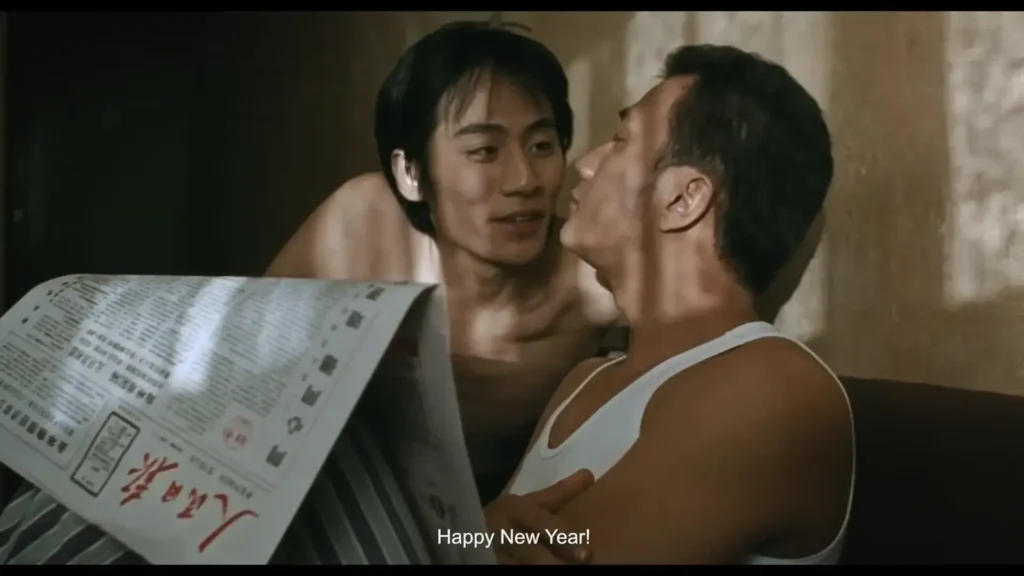
Country: Hong Kong
Runtime: 86 minutes
Rating: 8.4/10
Where to Watch: GagaOOLala, YouTube
Chen Handong and Lan Yu’s love tale starts with a sexual exchange. Lan Yu is a pure university student driven by events of life to sell his body at the time; Chen Handong is experienced in love relationships. Handong sees the unique Lan Yu as just another of his several playmates, yet being drawn to him right away. As their connection evolves, Handong finds gradually that Lan Yu has been silently filling his heart. He is unsure, though, and tries to establish his “normality” by getting married. Lan Yu has already vanished into the huge sea of humanity when he understands that was only a misleading impression.
Whether they are between heterosexuals or homosexuals, true love stories always cause viewers to sigh with feeling. Often connected with modest but rare traits like bravery, stubbornness, and purity is the love that moves viewers. Lan Yu (and Handong) fit that uncommon group of people, hence their love tale is much more valuable.
The fact that “Lan Yu” never emphasises the fact that two guys are involved throughout the whole movie makes it most poignant. It’s treated just as a standard love narrative. Lan Yu has always moist eyes and is like a small deer—gent but yet driven. Should you approach him, his fluffy head will nuzzle you. Something’s more likely to cause heart anguish the more lovely it is when damaged.

Country: Taiwan/China
Runtime: 120 minutes
Rating: 8.2/10 (IMDb)
Where to Watch: Amazon Prime, GagaOOLala
Through his performance of the old Kunqu opera “Lin Chong Flees by Night,” Lin Chong, a Kunqu opera artist, meets the engaged pair Wei Yinger and Xu Shaodong, therefore creating a relationship among the three. Though in heart he falls in love with Xu Shaodong, who really respects him as a person, Lin Chong submits to the tyranny and possession of the rich Huang Zilei. Xu Shaodong and Wei Yinger learn they do not love each other, rather they adore the opera actor Lin Chong. Thus, combined with social and family constraints, love and hate entwined between homosexuality and heterosexuality imprison them in an unavoidable situation.
Though we have seen less of it recently, subtlety is among the most poignant feature of Chinese-language films. Stories featuring three persons are always most lovely right at the meeting point. We may silence our thoughts to enjoy the beauty of Kunqu opera only in movies. A snowy night separating into a lifetime. It is running darkness, searching for a route of return invisible for a lifetime.
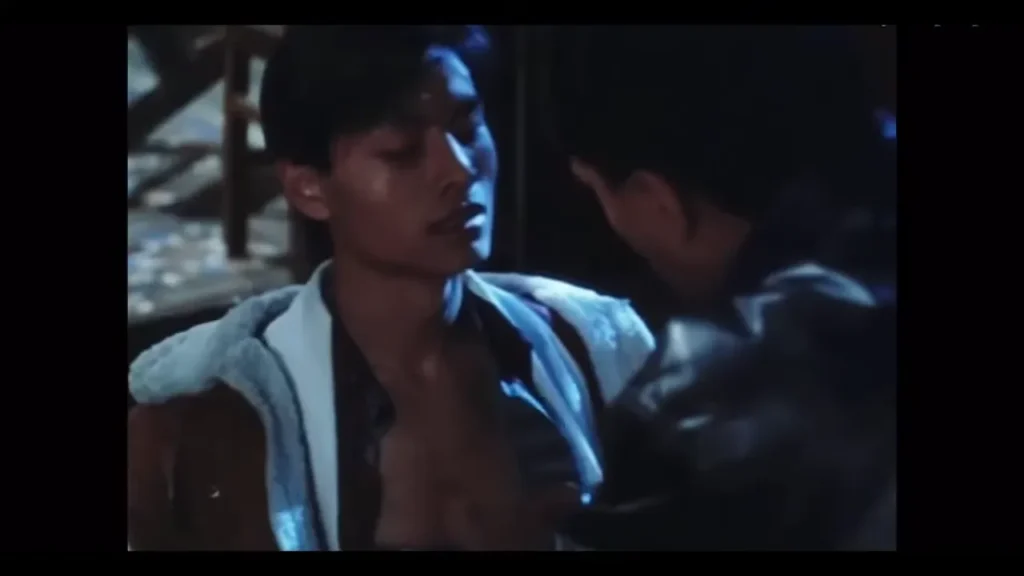
Country: China
Runtime: 90 minutes
Rating: 7.1/10
Where to Watch: Criterion Channel, MUBI
Nightly meetings for homosexuals take place in a particular Beijing park. Bored during his night shift, Officer Xiao Shi from the adjacent police station periodically captures gays for inquiry. To fill time and reduce boredom, he beats and chastises them as they admit their different “activities.” He handcuffs A-Lan, who exhibits a combination of obedience and resistance, one night and brings him back to the duty room.
Xiao Shi’s statements and behaviour during the questioning expose prejudice and contempt directed against A-Lan. A-Lan, on the other hand, expresses his love for Xiao Shi with a narrative about a death row prisoner and executioner, and exhibits no guilt about being gay. Xiao Shi finds gradually that he too carries a “Brokeback Mountain” in his heart.
Being the first gay film made on mainland China, “Behind the Forbidden City” obviously followed an unusual path. Still, it got right to the point and avoided physical depictions as much as possible, therefore escaping the limitations of the film censiting authority. Director Zhang Yuan’s brilliance helps to explain this; much more so is the result of scriptwriter Wang Xiaobo’s great mastery in perspective and psychological awareness.

Country: Taiwan/USA
Runtime: 108 minutes
Rating: 9.0/10
Where to Watch: Amazon Prime, Criterion Channel
Along with what seems to be a harmonic and practical Chinese philosophy of life, “The Wedding Banquet” has a festive name and an apparently happy finish. Still, this movie made me feel frigid at the very core.
Ang Lee’s work in “The Wedding Banquet” still exhibits traces of immaturity as a director; his numerous unpolished details throughout the picture deviate greatly from the painstaking workmanship of his post-“Crouching Tiger, Hidden Dragon” period. On the other hand, in terms of storyline and subject, I consider Ang Lee’s work to be among best. He put a lot of time and work into it, capturing with vivid, accurate, and clear images of cultural variations. Lee succeeded more in this movie as a screenwriter than as a filmmaker.
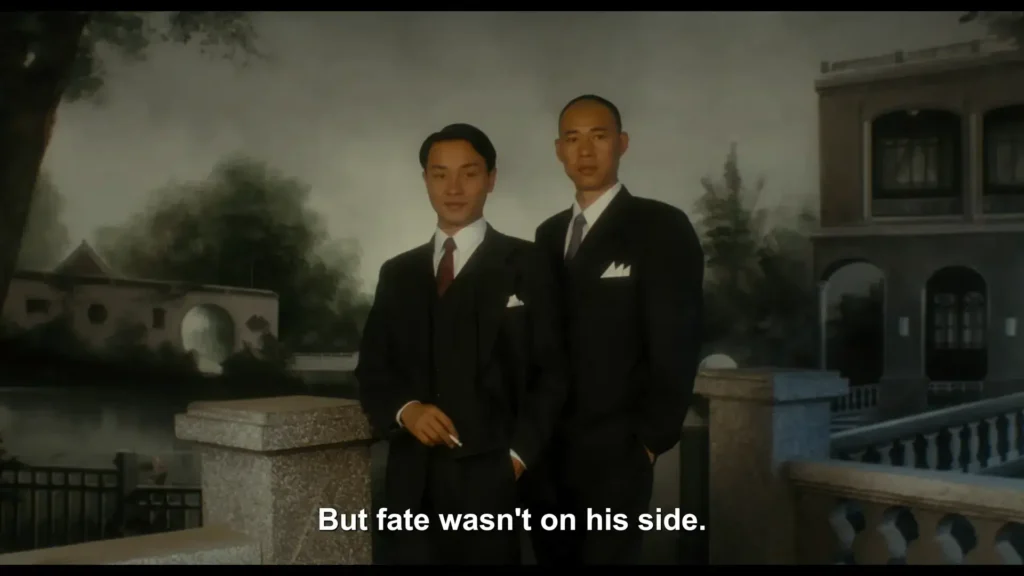
Country: Hong Kong/China
Runtime: 171 minutes
Rating: 9.6/10 (IMDb)
Where to Watch: Amazon Prime, iTunes, Criterion Channel
The epic movie “Farewell My Concubine” uses personal destinies to mirror China’s stormy past. Watching Douzi’s development, viewers see several political changes: from the Qing Dynasty thru the Beiyang Government and Civil War to the founding of the People’s Republic and Cultural Revolution. Using the concept of “learning opera, living opera, and dying for opera” to organise its narrative around the convoluted relationships between Cheng Dieyi, Duan Xiaolou, and Juxian, the film deftly recreates these historical periods.
The technical mastery of the movie is found in its flawless mixing of sound, music, and photography. With more than forty musical passages using traditional instruments like erhu and flute, it deftly combines Peking Opera components to provide an ambient tone matching the film’s style. With its rich imagery and delicate storytelling, “Farewell My Concubine” is a complex masterwork that naturally combines theater’s small stage with life’s large stage, so weaving together artistic careers and real life while providing great insights into Chinese culture.
FAQ About Gay Sports Movies
Are there any gay movies made in mainland China?
Yes, but due to censorship, most gay-themed films from mainland China are independent productions or short films. Notable examples include East Palace, West Palace (1996) and Lan Yu (2001). These films often circulate through film festivals or online platforms rather than official theatrical releases.
What are the most famous Chinese gay movies?
Some of the most well-known Chinese gay films include Lan Yu, Happy Together (by Wong Kar-wai), Farewell My Concubine, and Floating Skyscrapers. These movies are praised for their emotional depth, cinematic quality, and portrayal of queer identity in Chinese-speaking societies.
Are there any Chinese BL movies like Thai or Japanese BL?
China doesn’t produce BL movies in the same way as Thailand or Japan due to stricter content regulations. However, some Chinese web dramas and indie films touch on male-male romance in subtle or coded ways, such as Addicted (上瘾) or Your Name Engraved Herein from Taiwan.
Where can I watch Chinese gay movies with English subtitles?
Platforms like GagaOOLala, Vimeo On Demand, YouTube (for short films), and queer film festival websites often host Chinese LGBTQ+ films with English subs. Some older films like Lan Yu may also be available on DVD or unofficial streaming sources.
Are Chinese gay films censored?
In mainland China, LGBTQ+ themes are heavily censored on mainstream media platforms. Many queer films are either banned, only shown at international film festivals, or released online unofficially. Taiwanese and Hong Kong productions generally have more freedom of expression.
Do Chinese gay films have happy endings?
Many Chinese gay films tend to have bittersweet or tragic endings, reflecting social pressure and internal conflict. However, newer films and shorts — especially from Taiwan — are beginning to show more hopeful or open-ended narratives.
Is there a difference between Chinese gay films from the mainland, Taiwan, and Hong Kong?
Yes. Mainland films are more restricted and often use metaphor or ambiguity, while Hong Kong and Taiwan have more creative freedom. Taiwanese queer cinema, in particular, has produced internationally acclaimed works like Your Name Engraved Herein and Moneyboys.


